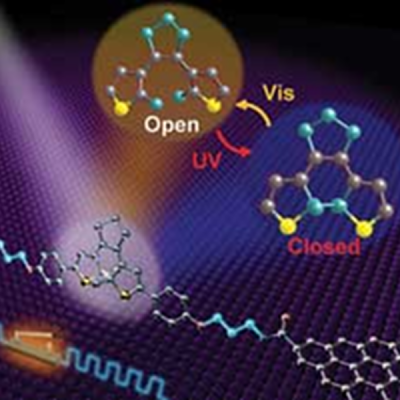Everything is getting smaller all the time. Computers used to take rooms, then desks, and now they fit in your pocket or on your wrist. Researchers that investigate light sensors have known that individual diarylethene molecules can exist in two states: one where it conducts electricity and one where it doesn’t. A visible photon causes the molecule to be electrically open and ultraviolet causes it to close. But there’s a problem.
 Placing electrodes on the molecule interferes with the process. Depending on the kind of electrode, the switch will get stuck in the on or off position. Researchers at Peking University in Beijing determined that placing some buffering material between the molecule and the electrodes would reduce the interference enough to maintain correct operation. What’s more the switches remain operable for a year, which is unusually long for this kind of construct.
Placing electrodes on the molecule interferes with the process. Depending on the kind of electrode, the switch will get stuck in the on or off position. Researchers at Peking University in Beijing determined that placing some buffering material between the molecule and the electrodes would reduce the interference enough to maintain correct operation. What’s more the switches remain operable for a year, which is unusually long for this kind of construct.
Using chemical vapor deposition and electron beam lithography, the team produced over 40 working single molecule switches. These devices could be useful in optical computing and other applications. Future work will include developing multilevel switches comprised of multiple molecules.
If you want something more macroscopic, you might try using an LED to sense light. A switch is fine, but sometimes you want to generate a signal.
















“can exist in two states: one where it conducts electricity and one where it doesn’t”
You say it doesn’t conduct in this state, I say you havent applied enough voltage :)
Don’t they call that a semiconductor?
Preuss’ Law (from an old shop instructor): “Anything will fit if inserted at the proper speed”.
Sounds like we need a corollary for voltage and “conductors”…
How about the saying “everything is a fuse”? I think it’s sufficiently general, true, and cryptic.
^ this
The Open/Closed part of the graphic seems to be wrong. Two additional atoms are on the ‘Open’ state. I can’t see the full text so I’m not 100% sure, but on checking the RSC site I see this was pointed out by someone in the comments 5 days ago.
You can detect light with only a single electron, in fact that is all you can do, photons interact with electrons.
https://www.youtube.com/watch?v=rAlxeTzRimg
If that one is not scientific enough for you this should suit you better,
https://www.youtube.com/watch?v=N9nWdNadklE
Here comes molecular memory… 40TB in the size of a sugar cube. Not the first to come up with a molecular light sensitive substance.
How reliable will electronic devices be once this kind of minaturization leaves the lab and becomes part of consumer devices? I would think that such a thing would be really delicate.
Lasts only a year so… perfect for the latest iPhone.
Yes they operate down at a level where quantum effects rule and everything is only describable as the outcome of probabilities. Very different ways of handling the information and embodying logic are required, but it is doable.